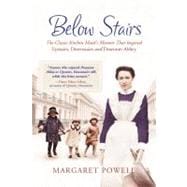
Note: Supplemental materials are not guaranteed with Rental or Used book purchases.
Purchase Benefits
What is included with this book?
MARGARET POWELL was born in 1907 in Hove, and left school at the age of 13 to start working. At 14, she got a job in a hotel laundry room, and a year later went into service as a kitchen maid, eventually progressing to the position of cook, before marrying a milkman called Albert. In 1968 the first volume of her memoirs, Below Stairs, was published to instant success and turned her into a celebrity. She died in 1984.
The New copy of this book will include any supplemental materials advertised. Please check the title of the book to determine if it should include any access cards, study guides, lab manuals, CDs, etc.
The Used, Rental and eBook copies of this book are not guaranteed to include any supplemental materials. Typically, only the book itself is included. This is true even if the title states it includes any access cards, study guides, lab manuals, CDs, etc.